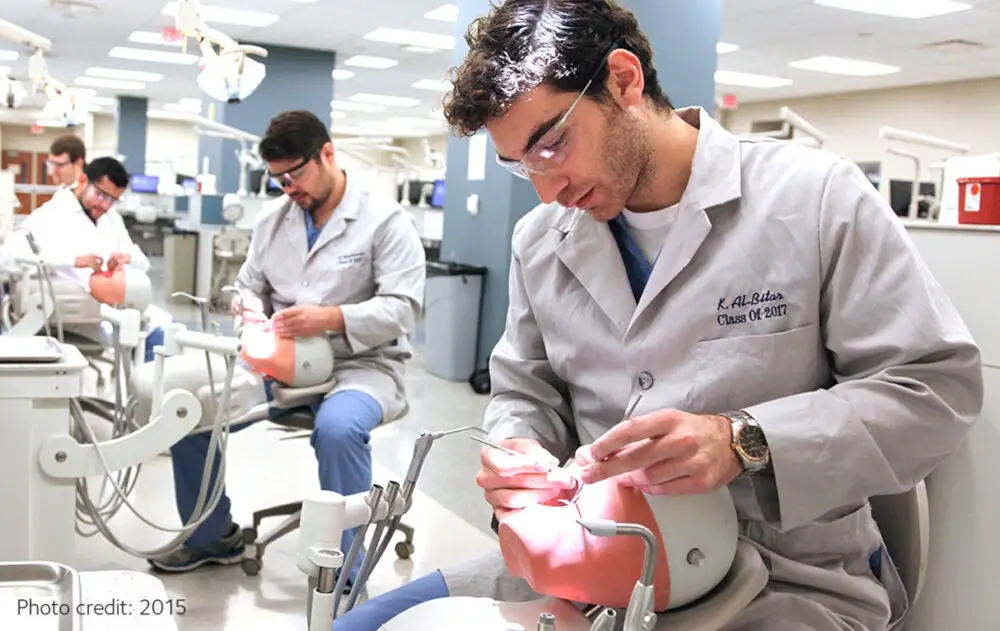Quick Guide: Dissolving Time of Wisdom Teeth Stitches in Your Mouth

Wisdom teeth extraction is a common dental procedure that requires stitches to be placed in the gums to promote healing and prevent infection. But, many patients are left wondering how long these stitches will remain in their mouth before dissolving. Dissolving time of wisdom teeth stitches varies depending on the type of stitch used, the location of the incision, and the patient’s individual healing process. However, understanding the factors that affect the dissolving time can help patients better prepare for recovery and alleviate any concerns they may have about the procedure. The dissolving time of wisdom teeth stitches can range from a few days to several weeks, but most commonly, they dissolve within 7-10 days. Dissolvable stitches, also known as absorbable stitches, are typically used for wisdom teeth extractions. These stitches are made from materials that break down over time, eliminating the need for removal. Dissolvable stitches are preferred by dentists because they reduce the risk of infection and eliminate the need for a follow-up appointment to remove the stitches.
Wisdom teeth stitches refer to the sutures that are used to close the incisions made during the extraction of wisdom teeth. These stitches are an essential part of the healing process, as they help to control bleeding and promote healing. The sutures are usually made of a dissolvable material that is designed to break down over time, eliminating the need for a follow-up appointment to have them removed. The dissolving time of wisdom teeth stitches varies depending on the type of material used, with some taking only a few days to dissolve and others taking up to two weeks. It is important to follow your dentist’s instructions on post-operative care and to monitor the progress of the stitches to ensure proper healing.
Dissolving time plays a crucial role in the healing process after wisdom teeth surgery. It determines the duration of the stitches in the mouth and the time it takes for them to dissolve naturally. The importance of dissolving time lies in its impact on the healing process. If the stitches dissolve too quickly, the wound may not have enough time to heal, resulting in complications such as bleeding or infection. On the other hand, if the stitches take too long to dissolve, they may cause irritation or discomfort to the patient. Therefore, closely monitoring the dissolving time of wisdom teeth stitches is essential for a successful and speedy recovery.
Factors Affecting Dissolving Time

Dissolving time is an important factor in the healing process of wisdom teeth extraction. The time taken for the stitches to dissolve completely in the mouth depends on several factors, including the type of suture material used, the location of the wound, and the patient’s oral hygiene. The most commonly used suture materials are synthetic or natural, and they can take anywhere from 3 to 14 days to dissolve. However, the location of the wound can also play a significant role in dissolving time, as wounds in areas of high movement or friction may take longer to heal and dissolve. Another factor that affects the dissolving time of wisdom teeth stitches is the patient’s oral hygiene. Maintaining good oral hygiene after an extraction can speed up the healing process and reduce the risk of infection. However, poor oral hygiene can prolong the healing process and increase the risk of complications. Patients should follow their dentist’s instructions carefully, which may include brushing and flossing gently around the wound, using a saltwater rinse, and avoiding certain foods or activities that may disrupt the healing process. By paying close attention to these factors, patients can ensure that their wisdom teeth stitches dissolve properly and that they can recover quickly and comfortably.
When it comes to wisdom teeth stitches, the type of stitch material used is an important factor in determining the dissolving time. There are two main types of stitch material: absorbable and non-absorbable. Absorbable stitches are made from materials that break down naturally in the body over time, such as polyglycolic acid or polylactic acid. These stitches typically dissolve within 7-10 days, and do not need to be removed. Non-absorbable stitches, on the other hand, are made from materials that do not break down in the body, such as nylon or silk. These stitches need to be removed by a dentist or oral surgeon after a week or two. It’s important to discuss with your dental professional which type of stitch material will be used in your wisdom teeth extraction, as this will affect the healing process and how long it takes for the stitches to dissolve.
The location of stitches after wisdom teeth extraction can vary depending on the type of extraction and the number of teeth removed. Generally, stitches are placed in the gum tissue to help control bleeding and promote healing. If the teeth were impacted or difficult to remove, the stitches may be in a deeper location. Some people may also have stitches on the cheek or tongue side of the extraction site. It is important to follow your dentist’s instructions for caring for your stitches to ensure proper healing and prevent infection. The dissolving time of the stitches can also vary depending on the type used, but your dentist will provide you with a timeframe for when they should dissolve on their own.
Oral hygiene is an important aspect of maintaining good oral health. It includes regular brushing of teeth, flossing, and using mouthwash to remove plaque and bacteria from the mouth. Poor oral hygiene can lead to a variety of dental problems, including gum disease, tooth decay, and bad breath. It is especially important to practice good oral hygiene after wisdom teeth removal surgery, as the stitches can trap food particles and bacteria in the mouth. To ensure proper healing and minimize the risk of infection, it is recommended to follow a strict oral hygiene routine and avoid eating hard or crunchy foods for a few days after the procedure.
Maintaining a healthy diet and lifestyle habits is crucial for a speedy recovery after wisdom teeth extraction. It is recommended to avoid hard and crunchy foods for the first few days, and instead opt for soft and easy-to-eat options such as smoothies, soups, and mashed potatoes. Smoking and alcohol consumption should also be avoided as they can delay the healing process. Additionally, getting plenty of rest and staying hydrated can help reduce swelling and discomfort. By adopting these diet and lifestyle habits, patients can ensure a smooth and successful recovery from wisdom teeth extraction.
Expected Dissolving Time for Wisdom Teeth Stitches

Wisdom teeth removal surgery is a common procedure that requires stitches to be placed in the mouth to promote healing and prevent infection. The type of stitch used in this procedure is known as a dissolvable stitch, which is made of materials that dissolve over time. The expected dissolving time for wisdom teeth stitches varies from person to person but typically ranges from 7 to 14 days. Factors such as individual healing time, the number of stitches needed, and the location of the stitches can all affect the dissolving time. It is important to follow the aftercare instructions provided by your oral surgeon to ensure proper healing and minimize any pain or discomfort. These instructions may include information on how to care for your stitches, what to eat or drink, and when to return for a follow-up appointment. If you experience any unusual symptoms such as excessive bleeding or swelling, contact your oral surgeon immediately. With proper care and attention, the dissolving time for wisdom teeth stitches can be relatively quick, and you can resume your normal activities in no time.
The dissolving time of materials used for sutures varies depending on the type of material used. Absorbable sutures, such as those made from catgut or polyglycolic acid, can dissolve within days to weeks, depending on the thickness of the suture material and the location of the wound. Non-absorbable sutures, such as those made from nylon or silk, do not dissolve and must be removed by a healthcare professional. However, there are also dissolvable stitches made from materials such as polycaprolactone or polydioxanone, which take longer to dissolve, up to several months. It is important to follow the post-operative instructions provided by your dentist or oral surgeon to ensure proper healing and minimize the risk of complications.
Dissolving stitches are commonly used in oral surgeries, including wisdom teeth removal. It is normal to experience some discomfort and swelling after this type of procedure. However, there are specific symptoms that you should look out for if you have dissolvable stitches in your mouth. These symptoms may include redness, swelling, pain, bleeding, or discharge around the wound area. If you experience any of these symptoms, it is essential to contact your dentist or surgeon immediately to prevent any further complications. It is also important to follow the post-operative instructions provided by the dental professional to ensure proper healing and to avoid any potential problems.
Tips for Promoting Faster Dissolving Time

Wisdom teeth removal surgery can be a painful and stressful experience, and the last thing you want is for the stitches to take too long to dissolve. Fortunately, there are several tips and tricks you can use to promote faster dissolving time and speed up the healing process. One of the most effective ways to promote faster dissolving time is to keep the area around the stitches clean and dry. This means avoiding drinking through straws, which can dislodge the stitches, and avoiding hot and spicy foods that can irritate the area. Instead, stick to soft, cool foods like yogurt, mashed potatoes, and ice cream to help soothe the area and promote faster healing. Another tip for promoting faster dissolving time is to stay hydrated. Drinking plenty of water helps to flush out toxins and impurities from the body, which can help to speed up the healing process. It also helps to keep the mouth moist, which can help to prevent the stitches from becoming dry and uncomfortable. In addition, you may want to consider taking pain relievers like ibuprofen or acetaminophen to help manage any discomfort or swelling. However, be sure to follow your dentist’s instructions carefully and never exceed the recommended dosage, as this can lead to serious side effects. By following these tips, you can help to promote faster dissolving time and get back to your normal routine in no time.
Proper oral hygiene is crucial in maintaining healthy teeth and gums, especially after undergoing oral surgery such as wisdom teeth extraction. It is recommended to brush your teeth twice a day with a soft-bristled toothbrush and fluoride toothpaste, paying special attention to the surgical site. Flossing is also important to remove any food particles that may be trapped in between teeth. Using an antiseptic mouthwash can help to reduce bacteria and prevent infection. Additionally, avoiding smoking and consuming alcohol can aid in the healing process. Proper oral hygiene practices not only promote faster healing but can also prevent future dental problems.
Practicing healthy diet and lifestyle habits is crucial for maintaining overall oral health and promoting efficient healing after wisdom teeth removal. A balanced diet consisting of nutrient-rich foods such as lean proteins, fruits, and vegetables provides the essential vitamins and minerals needed for tissue repair and immune system support. Additionally, avoiding sugary and acidic foods can prevent infection and promote a healthy environment in the mouth. Regular exercise and good sleep hygiene also play a vital role in promoting healing and reducing inflammation. Incorporating healthy habits into your daily routine can lead to a quicker and more comfortable recovery after wisdom teeth extraction.
Avoiding irritants and trauma to the mouth is crucial in ensuring that the wisdom teeth stitches dissolve in a timely and efficient manner. Patients should avoid consuming hot or spicy foods and drinks, as well as alcohol and tobacco products, as they can cause irritation and delay the healing process. Additionally, patients should be mindful of their oral hygiene routine and avoid brushing or flossing vigorously near the stitches, as this can cause trauma to the area and impair healing. By taking these precautions and following post-operative instructions, patients can promote healing and ensure that their wisdom teeth stitches dissolve as expected.
This article is about the dissolving time of wisdom teeth stitches in your mouth, which can significantly affect the healing process after wisdom teeth extraction. The dissolving time of stitches can vary based on the type of suture material used and, more importantly, your body’s healing response. Generally, dissolvable stitches take around one to two weeks to dissolve completely, while non-dissolvable stitches need to be removed manually. It’s crucial to avoid touching or irritating the stitches to prevent complications such as infection, bleeding, or delayed healing. Following the post-operative instructions provided by your dentist or oral surgeon can help ensure a smooth and speedy recovery.
Following postoperative care instructions is crucial to ensure the proper healing process and to prevent complications after any surgical procedure. It is especially important after wisdom tooth extraction, as this is a common procedure that requires stitches to be placed in the mouth. Disregarding the instructions provided by your dentist or oral surgeon can lead to bleeding, infection, prolonged healing time, and even the need for additional surgery. It is essential to follow the recommended guidelines, such as avoiding hard or crunchy foods, taking prescribed medications, and keeping the surgical area clean, to promote a healthy and speedy recovery. By following these instructions, you can ensure that the dissolving time of wisdom teeth stitches in your mouth goes smoothly, and you can return to your normal routine as soon as possible.
In conclusion, the dissolving time of wisdom teeth stitches can vary depending on several factors such as the type of suture material used, the location of the stitches, and the individual’s healing process. It is important to note that the dissolving time mentioned by the dentist or surgeon is an estimate and the actual time may vary. Patients should follow the post-operative care instructions provided by their dentist or surgeon, which may include avoiding certain foods and maintaining good oral hygiene. If the stitches have not dissolved within the expected timeframe or if there are any signs of infection or complications, patients should contact their healthcare provider immediately. Overall, proper care and attention during the healing process can help ensure a smooth and speedy recovery.
Conclusion

In conclusion, the dissolving time of wisdom teeth stitches can be influenced by various factors such as the type of suture used, the individual’s healing process, and oral hygiene. It is important to follow the aftercare instructions given by your dentist or oral surgeon to ensure proper healing and timely dissolving of the stitches. Patience and consistent care can ultimately lead to a successful healing process and a pain-free recovery. It is always advisable to consult with your dentist or oral surgeon if you are experiencing any discomfort or abnormality during the healing process.







